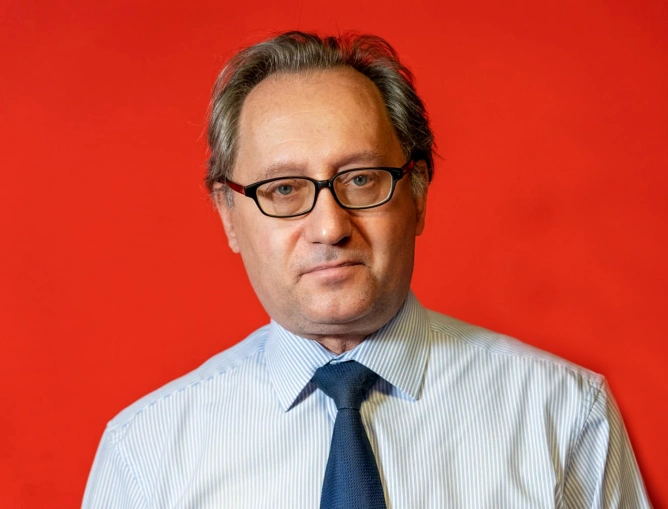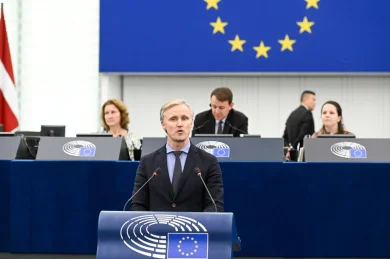27 November 16:17

Opinions
Foto Arhivă personală, Constantin Rudnițchi
Letta, Draghi, Niinisto. These are three names that have been mentioned very often lately in Europe. The first two are Italians, the third is Finnish, and they have drawn attention because they wrote three reports regarding the European Union. Letta analyzed the common market, Draghi – the competitiveness of the economy, while Niinisto focused on security from several perspectives.
All three reports, but especially the one by Mario Draghi, are frequently cited by specialists and politicians. The analyses of these three European experts (who also donned the clothes of politicians) have had an impact on Europeans in turn. The explanation is simple: the three reports were extremely realistic and highlighted the major problems of the European Union. It is likely that the general public, as well as specialists, found many of the sensitive areas they discover themselves in the European Union reflected in the three reports.
The three reports also contain a series of recommendations, but the public focused on problems and less on solutions. It was logical. The inventory of European sensitivities is easy to read – in contrast, it is difficult to make decisions that apply the recommendations. In fact, the best solution highlighted by all three reports is a more integrated European Union. This is the conclusion of European officials, except that concrete decisions for "more Europe" keep being postponed.
Recently, Enrico Letta came to Bucharest at the invitation of the publication Ziarul Financiar and spoke, of course, about the European common market. The diagnosis of the former Italian prime minister is that, in reality, the common markets of the European Union function only regarding goods and people. The other two freedoms, services and capital, cannot be considered European common markets.
The first problem Letta sees is the clinging to history. The example he gives is relevant: when the first version of the European common market was created in the 1980s, Italy was, economically, as big as China and India combined. Today, India and China are together twenty times larger than Italy. This is an example that shows how much the world and the global economy have changed. In the face of these changes, a more integrated Europe is needed, which truly has the economic traction of rival blocs, namely the USA and China.
The result of the lack of integration is dissipation, fragmentation. Regarding the financial market and the services market, Europe is by no means common, and Letta gives a few examples. Citing the European Central Bank (ECB), the former Italian prime minister says that Europeans have invested 300 billion euros (almost as much as Romania's GDP) in the American market, in American companies, which they finance and which then come and buy European firms. Why don’t Europeans buy shares in local firms and prefer to take their money to the American market? The answer is simple: because, unlike the fragmented European market, the American one is unified and tends to offer good returns. Beyond that, however, more important than the qualities of the American market are the defects of the European markets that policymakers fail to correct.
In many ways, Europe has decided to let member states decide. The adoption of the euro or the tax system are the most notorious cases. But there are also other examples, such as the European energy system. After the energy crisis triggered in 2021-2022, the European Union strengthened the principles of a single European market, but failed to impose a market in the true sense of the word. That is, Romania and part of Eastern Europe are not connected to the Western area because there is no functional electricity transport system between the two European regions.
It’s strange. Draghi tells us that Europe is not competitive against America and China. Letta tells us that Europe is too small, despite the large number of inhabitants, thus having a significant consumer market, and the total gross domestic product, thus economic power. Despite these important assets, Europe is small and underperforming against economic rivals.
Donald Trump's economic policy has further highlighted the weaknesses of Europe. In the opinion of experts, Europe's problems can be solved through deeper integration. In the opinion of entrepreneurs or citizens, Europe needs above all to reduce bureaucracy and have less interference, even if more integration means harmonization.
Enrico Letta demonstrated in Bucharest that the European Union needs "more Europe." More than a hundred people listened, likely resonating, most of them, with Letta's ideas and went home. When European leaders speak, thousands of people listen to them. After that, people go back to their jobs or businesses and come face to face with their Europe. A complicated Europe where integrationists, sovereignists, supporters of the market, or, on the contrary, against it, mix. European democracy accepts everyone. But citizens need to decide what exactly they want from Europe.
All three reports, but especially the one by Mario Draghi, are frequently cited by specialists and politicians. The analyses of these three European experts (who also donned the clothes of politicians) have had an impact on Europeans in turn. The explanation is simple: the three reports were extremely realistic and highlighted the major problems of the European Union. It is likely that the general public, as well as specialists, found many of the sensitive areas they discover themselves in the European Union reflected in the three reports.
The three reports also contain a series of recommendations, but the public focused on problems and less on solutions. It was logical. The inventory of European sensitivities is easy to read – in contrast, it is difficult to make decisions that apply the recommendations. In fact, the best solution highlighted by all three reports is a more integrated European Union. This is the conclusion of European officials, except that concrete decisions for "more Europe" keep being postponed.
Recently, Enrico Letta came to Bucharest at the invitation of the publication Ziarul Financiar and spoke, of course, about the European common market. The diagnosis of the former Italian prime minister is that, in reality, the common markets of the European Union function only regarding goods and people. The other two freedoms, services and capital, cannot be considered European common markets.
The first problem Letta sees is the clinging to history. The example he gives is relevant: when the first version of the European common market was created in the 1980s, Italy was, economically, as big as China and India combined. Today, India and China are together twenty times larger than Italy. This is an example that shows how much the world and the global economy have changed. In the face of these changes, a more integrated Europe is needed, which truly has the economic traction of rival blocs, namely the USA and China.
The result of the lack of integration is dissipation, fragmentation. Regarding the financial market and the services market, Europe is by no means common, and Letta gives a few examples. Citing the European Central Bank (ECB), the former Italian prime minister says that Europeans have invested 300 billion euros (almost as much as Romania's GDP) in the American market, in American companies, which they finance and which then come and buy European firms. Why don’t Europeans buy shares in local firms and prefer to take their money to the American market? The answer is simple: because, unlike the fragmented European market, the American one is unified and tends to offer good returns. Beyond that, however, more important than the qualities of the American market are the defects of the European markets that policymakers fail to correct.
In many ways, Europe has decided to let member states decide. The adoption of the euro or the tax system are the most notorious cases. But there are also other examples, such as the European energy system. After the energy crisis triggered in 2021-2022, the European Union strengthened the principles of a single European market, but failed to impose a market in the true sense of the word. That is, Romania and part of Eastern Europe are not connected to the Western area because there is no functional electricity transport system between the two European regions.
It’s strange. Draghi tells us that Europe is not competitive against America and China. Letta tells us that Europe is too small, despite the large number of inhabitants, thus having a significant consumer market, and the total gross domestic product, thus economic power. Despite these important assets, Europe is small and underperforming against economic rivals.
Donald Trump's economic policy has further highlighted the weaknesses of Europe. In the opinion of experts, Europe's problems can be solved through deeper integration. In the opinion of entrepreneurs or citizens, Europe needs above all to reduce bureaucracy and have less interference, even if more integration means harmonization.
Enrico Letta demonstrated in Bucharest that the European Union needs "more Europe." More than a hundred people listened, likely resonating, most of them, with Letta's ideas and went home. When European leaders speak, thousands of people listen to them. After that, people go back to their jobs or businesses and come face to face with their Europe. A complicated Europe where integrationists, sovereignists, supporters of the market, or, on the contrary, against it, mix. European democracy accepts everyone. But citizens need to decide what exactly they want from Europe.


